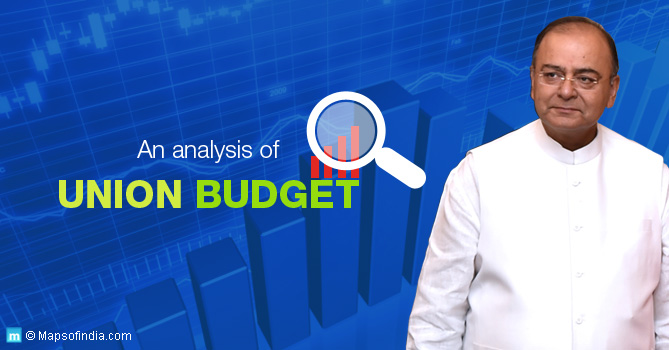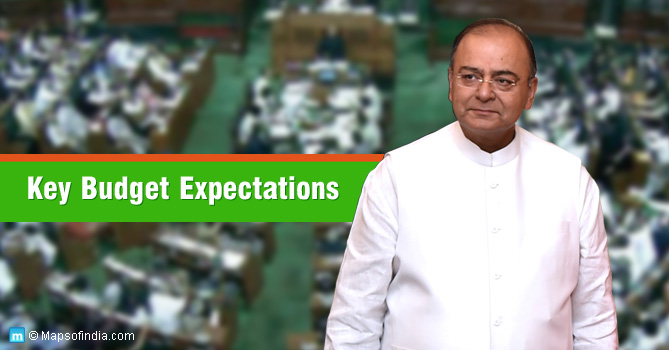The 2016-17 Union Budget was presented by Arun Jaitley, the Union Finance Minister, on 29 February 2016. As is expected, there were some things that became economical while there were a few others that became costlier. The Finance Minister sought to provide a timely boost to the residential sector, which is presently under a significant amount of duress, by providing exemptions on interest charged on housing loans – this was only for first time home buyers though. The affordable housing-related announcements were also a step in that particular direction. The government also did away with the dividend distribution tax charged on real estate investment trusts (REITs).
It is also expected that this decision will help the real estate developers generate more funds and investors – especially the common people who invest in shares – will find putting their money in these companies to be a more financially-rewarding proposition.
Fiscal deficit
During the budget, Jaitley stated that the fiscal deficit for 2016-17 stood at 3.5% of the GDP. Experts feel that this will provide some much-needed relief to the Reserve Bank of India (RBI) and it may even be able to reduce the interest rate.
Amendment in Companies Act
One of the major points of the budget was the amendment in the Companies Act with the aim of fostering startups and making sure companies are able to register quickly and start functioning. Experts opine that this will have a direct effect on the Securities Appellate Tribunal, which deals with orders that have been filed against orders of controlling bodies like IRDA and SEBI. At present SAT has one branch in Mumbai. If there is an increase in number of benches, entities will find it more convenient to file appeals and the number of pending cases will reduce as well.
Public sector banks recapitalization
The Indian Government allotted INR 25,000 crore for recapitalizing public sector banks. However, experts found the amount to be highly short of what was actually needed. They also welcomed the changes effected in SARAFESI Act in order to help companies in the business of asset reconstruction. However, they are also looking to see how the same changes will help the banks counter the NPA issues.
Amendment in RBI Act
The Union Finance Minister also stated that the RBI Act was going to be amended with the aim of establishing a monetary policy committee. According to experts, this was something that Raghuram Rajan, the RBI Governor, had wished as well. Setting up such a committee implies that it will be accountable in case it fails to meet the inflation target and it will also decide the fiscal policies of India. A group had previously been set up – under Urjit Patel – to review the existing framework and it had suggested that the new committee have more members from the RBI itself. Experts feel that it remains to be seen whether that is the case or not.
Announcements related to National Dialysis Programme
One of the talking points of the recently-announced budget was the operation of National Dialysis Programme under the private public partnership (PPP) model. Experts feel that this will be a major benefit for patients. At present, the daily cost of dialysis is INR 1500. The Finance Ministry has also exempted several dialysis equipments from paying customs duty.
Government’s health insurance plans
The Indian Government is looking to provide health insurance for each family at a highest rate of INR 1 lakh. It shall also provide top up of INR 35,000 in case of people older than 60 years. Experts have welcomed this step but have also cautioned that once implemented this plan could reduce the central administration’s healthcare expenses significantly. Another area of concern, as per them, is whether the country is keeping pace with its aims of universal healthcare.
Digital literacy schemes
The government is also expected to start a couple of digital literacy programmes in the rural areas. It is expected that in the coming three years this programme will cover 6 crore households. Experts expect a domino effect in this regard with greater levels of awareness and access to information. It is also expected that this will help companies that employ digital technology to get across to markets and consumers. One feels that the e-commerce industry will stand to gain the most from it.
Overall assessment
From the looks of it, the government has tried to bring about some steps that will help the economically underprivileged and the farmers such as providing cooking gas, creation of an irrigation fund, funds being made available to municipalities and gram panchayats in order to help the economy in villages and smaller towns, spending the highest amount for MNREGA, committing to complete electrification of villages etc. There are also several moves to benefit organic farming, which is a sensible decision given the health concerns of people across the country.
There are also several steps to boost the skill development scenario in India with money and infrastructure on the way. The government will also look to regulate working hours of malls and smaller establishments. It is also looking at developing road infrastructure in India, which is a welcome step. Rail infrastructure is also expected to improve with money being devoted towards the same. Government is also looking at improving port and rail infrastructure. On the business front, it has proposed more FDI-related reforms in domains such as insurance, asset restructuring companies, pension, and share markets. Government has also provided greater tax rebates and house rent allowance to help common people living in the cities. This has happened on expected lines.
In the financial sector the government is expected to provide more ATMs in post-offices and provide greater credit limits through its different microfinance institutions. There has also been improvement in the tax structure applicable for the new manufacturing establishments. Startups have also been granted tax exemption in first three years. In a bid to make the system more transparent and free of pollution the government has introduced unprecedented reforms like taxes and penalties on declared black money. Tobacco, jewellery, cars and other luxury items have become costlier.
In a way this budget represents a major change in the politico-economic stance expected from BJP, which is expected to pander to the richer classes. As may be seen, there are plenty of steps, which if implemented properly, will immensely benefit the economically-underprivileged people.
Explore More :
2016 Budget Session of Parliament
Is 2016 Union Budget Enough to Stop Farmers’ Suicides in India?
Key Expectations from Union Budget 2016-17
Railway Budget 2016 – An Analysis
Expectations from Rail Budget 2016
Budget 2016: Change on the cards?
Top 50 Takeaways From Union Budget 2015-16
Union Budget 2015-16 – Policies, Promise and Key highlights
Railway Budget 2015-16 Highlights






